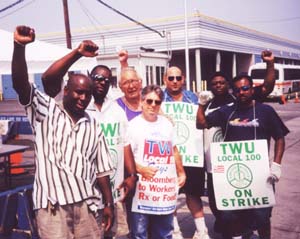


|
| Militant/Dan Fein |
|
Bus drivers picket Queens Surface Corp.
|
At the picket line in front of the Queens Surface Corp., Roy, a striker, told the Militant that members of other unions had joined the picket line and a rally to support the strike, including janitors who are members of the Service Employees International Union Local 32BJ and transit workers.
Martin Florio of Flushing, Queens, told Newsday that after waiting in vain for 15 minutes for a Q65 bus, "I feel sorry for the bus drivers. They should get everything they ask for." Striker Toni Varner at Triboro Coach said "the train stations are too far to walk -- sometimes 2.5 miles. The mayor should walk to the subway and see how he likes it."
The strikers are members of Transport Workers Union (TWU) Local 100. The union organizes Queens Surface Corp., Triboro Coach Corp., and Jamaica buses, in addition to the thousands of transit workers who keep the subway and bus lines running. The contract of the subway workers expires next December.
The union members have been without a contract since January 2001. This past January workers organized a two-hour wildcat strike to demand a contract. They struck again for two days in February, both times being urged back on the job by the union officials. Following these actions the companies reached a tentative agreement with the union, pending city approval.
The current strike centers on medical coverage for the workers. The Queens private bus lines have been receiving significant city subsidies since the 1970s. This year the city will spend an estimated $110 million on contracts with seven companies operating in Queens. The fares are comparable to the city bus fares and the busses use the citywide Metro Card, a discounted fare-card.
New York City owns the buildings, buses, and property at the Queens Surface Corp. facility and leases them to the company at nominal rates. In the past the city has been involved in the collective bargaining negotiations sessions between TWU Local 100 and the bus companies.
In March the city agreed to contribute to the TWU Local 100 health benefit fund using the same formula as was agreed to with the public workers union that represents 250,000 city employees. The formula calls for a 19 percent increase of payments into the fund over the next two years to keep up with the rising cost of medical care.
The strike was sparked when City Department of Labor Relations Commissioner James Hanley told the union that the city would only increase the contributions by 3.5 percent over two years.
As his way of announcing his refusal to negotiate, Mayor Michael Bloomberg said the first day of the strike that the city is "not going to get involved in a private dispute."
At Triboro Coach striker Vincent Charles Gagliardo, a 25-year-old driver, said "the city is just trying to bust the union. New York City was built on union labor. We should stay out as long as necessary and paralyze Queens and Manhattan."
George Gunkel, a driver for Queens Surface, said the city wants to "take away more than they give. The city administration, headed by Bloomberg, only wants to take. I believe in our union." Wayne Robbers, also at Queens Surface and a driver, added he was "surprised the strike has lasted this long. I thought it would be over by now."
A Black women who is a transit toll booth worker and member of TWU Local 100 has been picketing everyday. Her husband is on strike. "The strike has brought unity," she said. "Everyone is together. We now have a sense of pride and closeness. Now the union is a closer-knit family."
Toni Varner, a new driver with six weeks on the job, said, "The union is breaking me in the right way. For single parents like me the cost of medical care is too hard on you. You’ve got to have benefits to take care of your kids."
Front page (for this issue) |
Home |
Text-version home